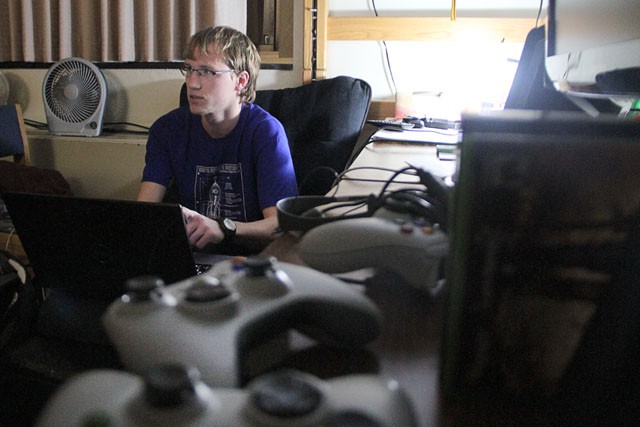When she started analyzing video games three years ago, Kyong Shim wasnâÄôt taken very seriously.
People questioned the idea of learning from the games. Now the U.S. Army is on board and is one of many groups looking to use the massively multi-player online role-playing game (MMPORG) research to advance training for soldiers.
The Army will use the teamwork aspect of MMORPGs to improve communication and work toward a common goal, said Shim, a doctoral candidate at the University of Minnesota.
âÄúThere are obviously a lot of benefits from using something like MMORPGs for studying group behaviors and communication behaviors,âÄù Shim said.
Shim and other researchers from universities across the country hunted through activity of anonymous gamers playing EverQuest II for patterns and communication characteristics. Sony provided researchers with anonymous player communications, game logs and other game data.
Players on games like EverQuest II often team up to work toward a common goal, which is why first-year Derek Anderson wasnâÄôt surprised the Army was interested in the findings.
âÄúGenerally, if you need to do something [in the game], itâÄôs hard to do it alone,âÄù said Anderson, a computer science student whoâÄôs familiar with role playing games.
Guilds, or teams of players, depend on each other to advance through game levels.
The Army currently uses several games to help train soldiers, Shim said. Her goal is to help improve the games so they will better benefit soldiers in training.
In August, several of the researchers traveled to Death Valley, Calif., to observe soldiers in training.
After printing the findings in multiple publications, Shim and University computer science professor Jaideep Srivastava are attracting the attention of not only the Army but also other government agencies that hope to see connections between virtual and real-world behaviors.
By the end of next week, Shim and Srivastava will have filled out six grant proposals âÄî four of them for National Science Foundation grants that will help the team complete the second phase of their research, which will hone into how playing affects playersâÄô behavior in the real world.
Officials at the Intelligence Advanced Research Projects Activity, part of the U.S. Office of the Director of National Intelligence, were interested in how real-world interactions emerge in the virtual world. After successfully mapping a correlation between the two worlds, IARPA officials want to know how playing these games affect real-world behavior.
âÄúAfter a few years of research, we came up with a fairly innovative way of how classical social science and computer science approaches can be combined,âÄù Srivastava said.
By using artificial intelligence, researchers were able to look for interesting patterns within the terabytes upon terabytes of data collected, he said.
âÄúIn these virtual worlds, a lot of data is being collected, and from those behavior tracts you can infer a fair amount of stuff,âÄù Srivastava said.
Gender benders
The research also found statistics based on age and gender of players and how many hours each play per week.
Besides confirming the expected âÄî like the high number of male players between 18 and 25 years of age, the findings showed a relatively high number of female players on EverQuest II.
âÄúGirls are not interested in shooting each other, like [in] Halo,âÄù Shim said.
Anonymous survey results came from more than 7,000 players who were enticed to participate with in-game benefits. Shim found that many females hide their true gender by playing as a male avatar.
On average, a female MMORPG gamer played 26 hours of the game a week âÄî two more hours than a male player, Shim said.
âÄúThatâÄôs probably because [RPGs] are less intenseâÄù and technical than games that are more popular with men, Shim speculated.
Ironically, the games can also serve as a way for women to spend time with their male partner, who may pay more attention to the game than to her, Shim said.
The wide range of age groups within MMORPG games was also a surprise.
âÄúYou donâÄôt expect to see people over 40 or 50 years old trying to get into your guild,âÄù Shim said.

First year computer science student Derek Anderson plays computer games on Monday in his dorm room. The the U.S. army is currently looking to use the research to advance training for soldiers by using the teamwork aspect of MMORPG games to improve communication and work towards a common goal.
From EverQuest to Afghanistan: Army, U teach teamwork
Researchers questioned University grad student Kyong Shim when she said she wanted to study video games — until the U.S. Army came calling.
by Frank
Published January 26, 2011
0
More to Discover







